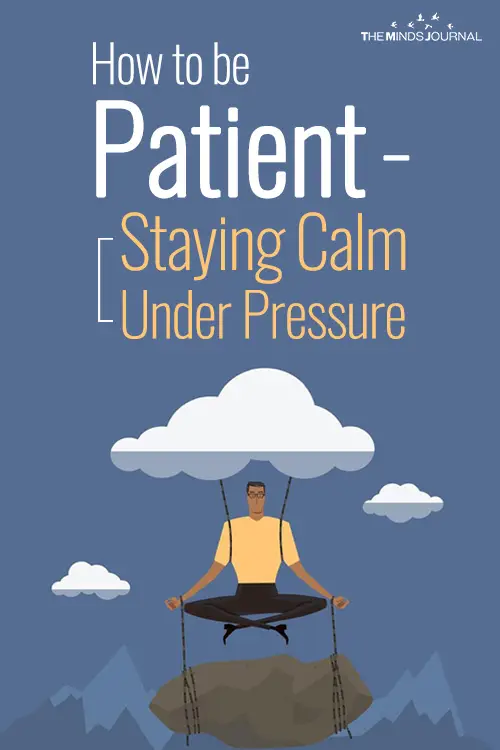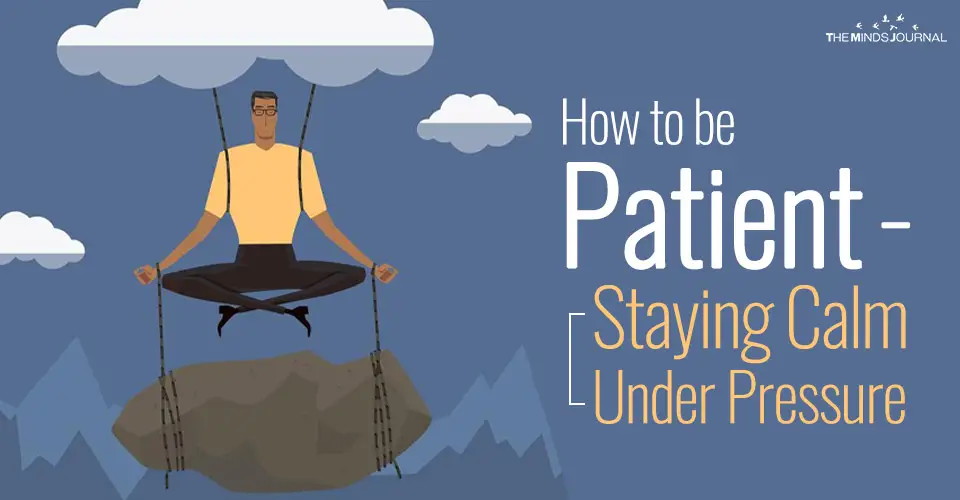Learn how to be patient by staying calm under pressure.
Here’s the problem: you’re waiting for someone to finish compiling a report that you need for a meeting. Because of an issue that came up, you’re already 15 minutes late.
You can feel your body getting tense, and you’re getting quite cross. You start sweating, and suddenly you yell at the person for being slow and putting you behind schedule. You can tell she’s hurt, but you can’t help it. She’s making you late! Does this sound familiar? Many of us are impatient at times. Losing control of our patience hurts not only us but those around us. Impatience raises our stress level and can even cause physical harm to our bodies. Being impatient can also damage relationships.
In this article, we’ll examine strategies that you can use to be more patient.

Why Practice Patience?
Others often see impatient people as arrogant, insensitive, and impulsive. They can be viewed as poor decision-makers because they make quick judgments or interrupt people. Some people will even avoid impatient people, because of their poor people skills and bad tempers.
People with these personality traits are unlikely to be at the top of the list for promotions to leadership positions. Impatience can even affect relationships at home.
The more patient you are with others, the likelier you are to be viewed positively by your peers and your managers, not to mention your family and friends.
Read Staying Calm in the Midst of Chaos
Signs of Impatience
How do you know when you’re being impatient? You will probably experience one or more of the following symptoms:
- Shallow breathing (short breaths).
- Muscle tension.
- Hand clenching/tightening.
- Jiggling/restless feet.
- Irritability/anger.
- Anxiety/nervousness.
- Rushing.
- Snap/quick decisions.
Finding Your Causes
If you experience the symptoms of impatience, your next step is to discover the true cause. Many of us have “triggers.” These could be people, phrases, or specific situations (like rush-hour traffic) that regularly cause us to enter an impatient frame of mind.
Make a list of things that cause you to become impatient. If you’re having trouble identifying your triggers, use these tips:
- Stop and think about the last time you were impatient. What caused it? You can narrow this down to the root cause by using the 5 Whys technique.
- Ask your family, friends, and co-workers about your impatience. Chances are that they know what gets you “wound up”.
- Many people become impatient due to physical factors such as hunger, dehydration, or fatigue. Analyze your body the next time you start to feel impatient. A simple remedy might be a snack and a glass of water!
- Keep a journal with you to record when you start to feel impatient. Write down what the situation is, and why you’re getting frustrated.
Identifying your triggers helps because it forces you to examine your actions and uncover why you’re doing what you’re doing. This knowledge also helps you devise strategies to avoid becoming impatient.
Of course, it would be great if you could avoid the triggers that make you impatient. But for most of us, that’s just not possible. So you have to learn to manage impatience instead.
Managing the Symptoms
When you feel impatient, it’s important to get out of this frame of mind as quickly as possible. Try these strategies:
- Take deep, slow breaths, and count to 10. Doing this helps slow your heart rate, relaxes your body, and distances you emotionally from the situation. If you’re feeling really impatient, you might need to do a longer count, or do this several times.
- Impatience can cause you to tense your muscles involuntarily. So, consciously focus on relaxing your body. Again, take slow, deep breaths. Relax your muscles, from your toes up to the top of your head.
- Learn to manage your emotions. Remember, you have a choice in how you react in every situation. You can choose to be patient, or choose not to be: it’s all up to you.
- Force yourself to slow down. Make yourself speak and move more slowly. It will appear to others as if you’re calm – and, by “acting” patient, you can often “feel” more patient.
- Practice active listening and empathic listening. Make sure you give other people your full attention and patiently plan your response to what they say.
- Remind yourself that your impatience rarely gets others to move faster – in fact, it can interfere with other people’s ability to perform complex or highly-skilled work. All you’re doing is creating more stress, which is completely unproductive.
- Try to talk yourself out of your impatient frame of mind. Remind yourself how silly it is that you’re reacting this way. People often don’t mind if a meeting is delayed, just as long as you let them know that you’re running late in advance.
- If your impatience causes you to react in anger toward others, use anger management techniques to calm down.
- Some people become impatient because they’re perfectionists. However, in addition to causing impatience, perfectionism can actually slow productivity and increase stress. Learn how to stop being a perfectionist.
Remember that, although many people are naturally patient, the rest of us need to practice patience for it to become a habit. Becoming more patient won’t happen overnight, but do persist – it’s so important!
Key Points
Many of us struggle with impatience. But if we want healthy work relationships and a successful career, then we need to spend time making patience a habit.
Start by identifying your triggers. Often a specific person or situation can immediately cause you to become impatient. When you identify the specific causes, you’re better able to discover why it’s happening. You can then use strategies to overcome your impatience.









Leave a Reply
You must be logged in to post a comment.